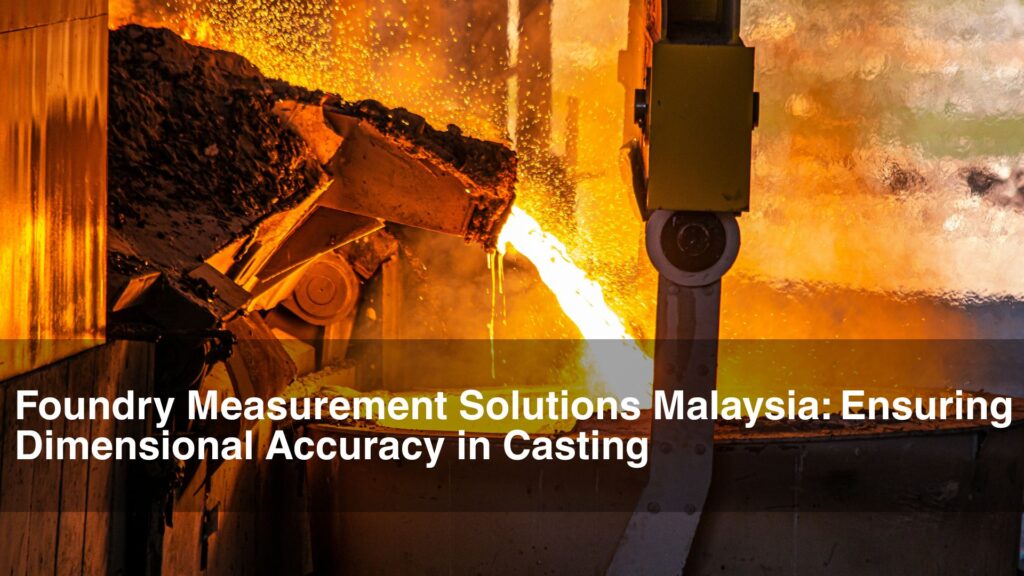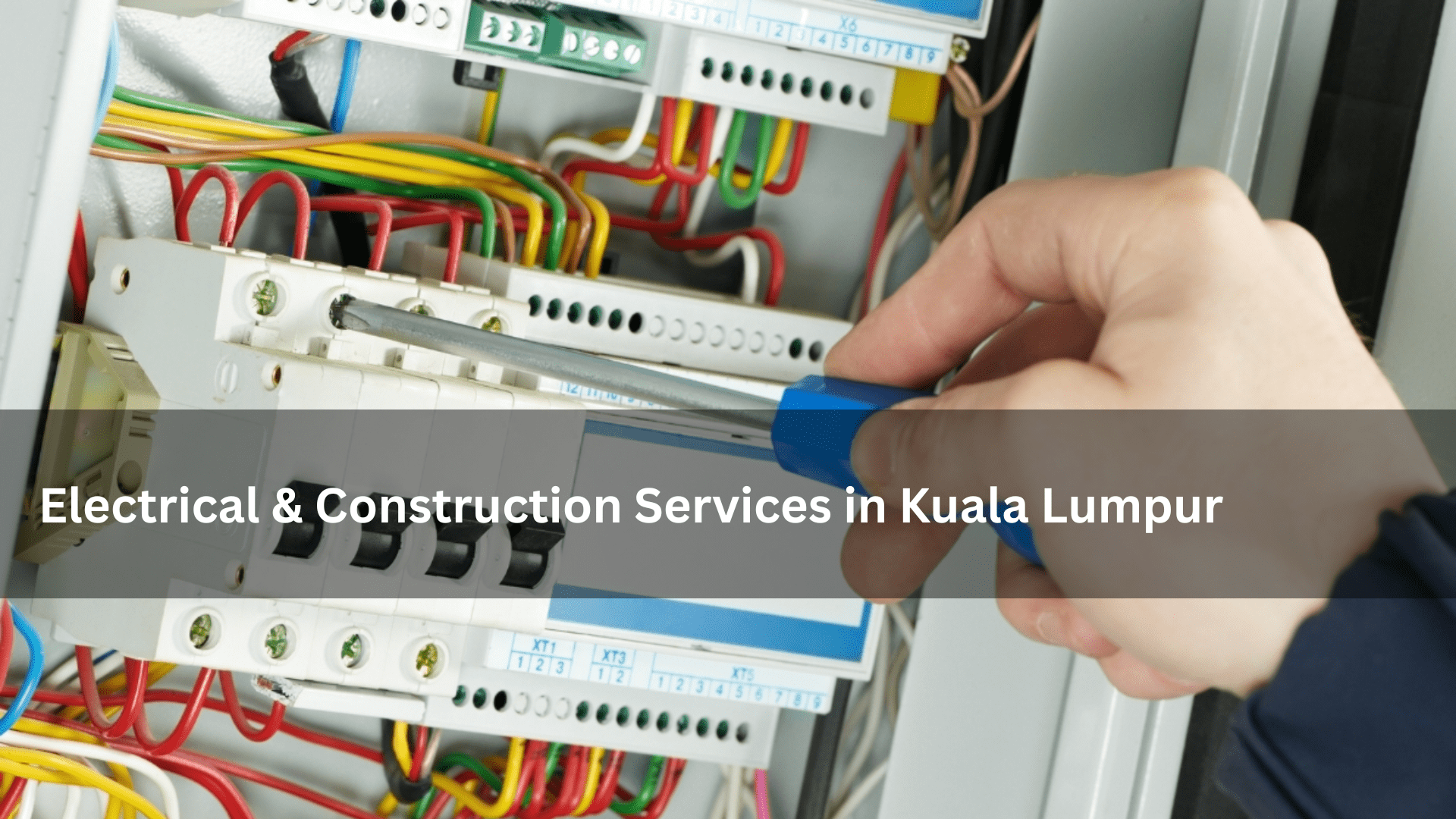Introduction to Foundry Measurement Solutions Malaysia
The foundry industry in Malaysia has witnessed significant advancements in recent years, particularly in the realm of measurement solutions. These foundry measurement solutions Malaysia provide critical assessments of dimensional accuracy, which are essential for ensuring the quality and functionality of cast components. As the manufacturing sector evolves to meet increasing quality standards and consumer demands, the importance of precision in casting dimensions becomes increasingly evident.
With a growing focus on manufacturing efficiency and product reliability, foundries are increasingly adopting advanced measurement technologies. These solutions encompass a range of methodologies and tools designed to evaluate various aspects of cast parts, including size, shape, and surface integrity. The integration of sophisticated measurement systems not only aids in adhering to stringent industry standards but also reduces the risks of defects and rework, ultimately leading to enhanced productivity.
The implementation of foundry measurement solutions Malaysia offers a multitude of benefits that extend beyond mere compliance. These systems enable manufacturers to gain deeper insights into their production processes, facilitating data-driven decision-making. Additionally, the utilization of such technology allows for quicker responses to any discrepancies observed during the casting process, thereby minimizing downtime and maximizing operational efficiency.
Moreover, the landscape of foundry measurement is continuously evolving, with innovations such as 3D scanning, laser measurement, and non-destructive testing emerging as vital components in the quality assurance framework. These cutting-edge technologies support the increasingly complex designs being introduced into the market, ensuring that manufacturers can produce components that not only meet but exceed customer expectations. As Malaysia’s foundry sector continues to develop, the emphasis on precision through effective measurement solutions will remain a cornerstone of successful operations.
The Importance of Dimensional Accuracy in Foundry Measurement Solutions Malaysia
Dimensional accuracy is a critical aspect of the casting process, as it directly influences the quality, functionality, and overall performance of the final product. In numerous industries, including automotive, aerospace, and machinery, the precision achieved during casting operations forms the cornerstone for producing components that meet stringent specifications and operational demands. Inevitably, any deviation from the designed dimensions can lead to costly consequences, ranging from performance issues to product failures. Hence, investing in effective foundry measurement solutions in Malaysia becomes essential to mitigate such risks.
When dimensional inaccuracies arise during the casting process, they can compromise product quality in many ways. For example, components that do not adhere to the specified tolerances may lead to improper fitting, misalignment, or reduced load-bearing capacity. These shortcomings can ultimately result in increased wear and tear or even premature failure of the end product. Moreover, in industries where safety is paramount, such as aerospace or medical equipment manufacturing, the repercussions of dimensional inaccuracy can be dire, affecting both operational integrity and safety standards.
In addition to influencing product quality, dimensional accuracy enhances manufacturing efficiency. When accurate measurements are utilized during the casting process, it reduces the need for modifications, rework, and wastage of materials. This not only expedites production timelines but also optimizes resource utilization, leading to significant cost savings for manufacturers. By leveraging advanced foundry measurement solutions available in Malaysia, companies can achieve the necessary precision to streamline operations and produce high-quality castings consistently.
Ultimately, the significance of dimensional accuracy in casting cannot be overstated. It plays a pivotal role not only in determining the quality and functionality of products but also in promoting manufacturing efficiencies across the board. Without reliable measurement solutions, manufacturers may struggle to meet the rigorous standards expected in today’s competitive landscape.
Overview of Precision Tools for Foundry Measurement Solutions Malaysia
In the ever-evolving landscape of foundry measurement solutions Malaysia, the importance of precision tools cannot be overstated. These tools are designed to ensure that the dimensions of cast components conform meticulously to predetermined specifications, thus enhancing the quality and reliability of the final products. A range of precision instruments is employed, each serving a unique function in the measurement process.
One of the fundamental tools used within this sector is the caliper, which is essential for measuring both external and internal dimensions of objects. This versatile tool is available in various formats, including vernier calipers and digital calipers, each offering differing levels of accuracy and ease of use. Digital calipers, in particular, have gained popularity due to their ability to present measurements clearly on an electronic display, ensuring that users can quickly interpret results.
Another critical instrument is the gauge, specifically dedicated to measuring specific dimensions. These may include thickness gauges and height gauges, which help in assessing the varying parameters of casting parts, ensuring that manufactured items adhere to industry standards. The precision of these gauges often determines the quality of the final product, thereby playing a pivotal role in minimizing errors during the manufacturing process.
Digital measuring devices, including laser measurement systems, have also been integrated into foundry measurement solutions in Malaysia. These advanced technologies enable rapid, non-contact measurements, offering unparalleled accuracy and calibrating capabilities. By utilizing sophisticated algorithms, these devices can deliver high-resolution data that informs the production process, fostering efficient manufacturing workflows.
Overall, the employment of these precision tools within foundry measurement solutions Malaysia not only ensures dimensional accuracy but also significantly contributes to improved productivity and quality assurance within the casting industry.
3D Measurement Systems in Foundry Measurement Solutions Malaysia
In the realm of foundry measurement solutions Malaysia, 3D measurement systems are pivotal, revolutionizing the way dimensional accuracy is achieved in casting processes. These systems utilize advanced technologies such as laser scanning, structured light, and coordinate measuring machines (CMMs) to provide precise and metrological insights into the geometrical characteristics of complex castings.
Laser scanning, one of the leading technologies, captures detailed surface profiles by projecting laser beams onto a part and measuring the distance traveled by the reflected light. This non-contact method is exceptionally efficient for obtaining high-resolution 3D data, ideal for intricate shapes often found in metal castings. Structured light, which involves projecting a sequence of patterns onto a surface, complements this by allowing real-time analysis of deformation and accuracy in three-dimensional space.
Moreover, CMMs have become integral to these measurement solutions, as they can be used to capture precise dimensional data through mechanical, optical, and laser-based techniques. With their capability to automate measurement processes, CMMs significantly enhance productivity and reduce human error, ensuring a consistent standard in quality control during the manufacturing phases.
The integration of these 3D measurement systems in foundry practices not only enables real-time monitoring but also facilitates the simulation of casting processes, allowing for adjustments prior to production phases. This technological advancement leads to reduced material waste and improved turnaround times, crucial for maintaining competitiveness in the foundry sector.
In conclusion, the utilization of advanced 3D measurement systems within the framework of foundry measurement solutions Malaysia is essential for achieving superior accuracy and optimizing efficiency in casting processes. By leveraging technologies such as laser scanning, structured light, and CMMs, manufacturers can ensure dimensional accuracy, catering to the increasing demands of various industries.
Quality Assurance in Foundry Measurement Solutions Malaysia
Quality assurance is a critical aspect in the manufacturing sector, particularly in foundries, where precision is vital for the integrity and functionality of cast components. Foundry measurement solutions Malaysia play an essential role in establishing a thorough quality assurance framework that aligns with both industry standards and regulatory requirements. These measurement solutions encompass a range of technologies and methodologies aimed at ensuring dimensional accuracy, which is paramount in the casting process.
In the context of foundry measurement solutions Malaysia, advanced tools such as 3D scanners, coordinate measuring machines (CMMs), and optical measurement systems are employed to monitor various parameters throughout the production cycle. By regularly assessing the dimensional attributes of cast products, these measurement tools enable manufacturers to detect potential discrepancies early in the production process. This proactive approach not only minimizes the risk of defective products but also significantly reduces waste and enhances overall operational efficiency.
Additionally, adopting foundry measurement solutions Malaysia assists businesses in adhering to stringent regulatory compliance. Many industries have predefined specifications that must be met to ensure safety and quality; thorough measurement practices are crucial for meeting these compliance standards. As such, manufacturers can leverage technological advancements to bolster their quality assurance practices, thereby ensuring reliable performance of their cast products in real-world applications.
Ultimately, the integration of effective foundry measurement solutions in Malaysia leads to enhanced product reliability, customer satisfaction, and a strong competitive edge in the marketplace. As the manufacturing landscape continues to evolve, businesses must prioritize quality assurance through precise measurement techniques to maintain high standards and meet the expectations of both clients and regulatory bodies.
Case Studies: Successful Implementation of Foundry Measurement Solutions Malaysia
In the rapidly evolving foundry industry, the adoption of advanced measurement solutions is paramount for ensuring precision and efficiency in casting processes. Several Malaysian companies have successfully implemented foundry measurement solutions, demonstrating their effectiveness in overcoming production challenges and enhancing final product quality. This section explores notable case studies that highlight real-world applications and outcomes.
One such case study involves a prominent automotive component manufacturer located in Selangor. The company faced significant challenges related to dimensional inaccuracies in their castings, which resulted in increased rework rates and delays in production. To combat these issues, the management opted to adopt an integrated foundry measurement solution that included laser scanning technology and advanced software for data analysis. The implementation led to a 30% reduction in dimensional errors, directly contributing to improved assembly line efficiency and reduced costs. By incorporating these foundry measurement solutions in Malaysia, the manufacturer not only boosted their production capabilities but also enhanced customer satisfaction through higher-quality products.
Another illustrative case can be found in a Malaysian aerospace components manufacturer operating in Penang. This company needed to ensure compliance with stringent international standards for aerospace parts. Previously, diverse measurement methods led to inconsistencies and difficulties in achieving required tolerances. By adopting dedicated foundry measurement solutions incorporating optical measurement devices, the manufacturer was able to streamline their processes considerably. The result was a two-fold improvement in first-pass yield rates, leading to reduced scrap rates and savings in material costs. These outcomes not only met compliance standards but also positioned the company as a competitive player in the aerospace sector.
Through these case studies, it becomes evident that foundry measurement solutions in Malaysia play a crucial role in mitigating production challenges, improving product quality, and enhancing operational efficiency. The transformational impact of these systems underscores their importance in the modern foundry landscape.
Challenges in Implementing Foundry Measurement Solutions Malaysia
The implementation of foundry measurement solutions in Malaysia can present several significant challenges for manufacturers. One of the primary obstacles is the cost associated with acquiring and integrating advanced measurement technology. High-quality foundry measurement solutions often require substantial capital investment, which can be a deterrent, particularly for small and medium enterprises. These companies may struggle to justify the expense, especially when operating on tight margins. It is crucial for these businesses to explore various financing options, such as government grants or industry-specific subsidies, which may alleviate some of the financial burden.
Another challenge lies in the need for comprehensive staff training. The adoption of new foundry measurement solutions often necessitates the upskilling of personnel who may be unfamiliar with advanced measurement techniques or technologies. This can lead to delays in implementation and decreased productivity, as the workforce requires time to adapt and learn. Manufacturers can address this challenge by prioritizing training programs that focus on practical applications and hands-on experience. Partnering with solution providers can also facilitate access to specialized training resources and workshops that enhance employee technical proficiency.
Additionally, technology integration poses a significant hurdle. Manufacturers may already have existing systems in place, and integrating new foundry measurement solutions with legacy systems can be complex. This complexity often leads to operational disruptions and inefficiencies during the transition period. To overcome these obstacles, manufacturers should engage in careful planning and assessment before launching any new measurement system. Engaging with technology experts who understand the specifics of foundry operations in Malaysia can provide valuable insights into effective integration practices. Collaboration with vendors that offer compatibility and support services can also streamline the entire process, ensuring a smoother transition to innovative measurement solutions.
Future Trends in Foundry Measurement Solutions Malaysia
The foundry industry in Malaysia is on the cusp of transformative advancements, particularly in the realm of measurement solutions. As manufacturers face increasing global competition, there is a growing emphasis on precision engineering. This focus is driving the adoption of innovative technologies to ensure dimensional accuracy in castings. Emerging trends point towards enhanced automation and sophisticated data analytics as key components that will shape foundry measurement solutions in Malaysia.
One notable trend is the rise of advanced sensing technologies, including 3D scanning and digital imaging. These tools facilitate real-time inspection and feedback, enabling manufacturers to detect anomalies early in the production process, thereby reducing material waste and enhancing product quality. The integration of machine vision systems with foundry measurement solutions in Malaysia will streamline the inspection process. This integration not only ensures accuracy but also decreases manual labor costs, leading to a more efficient workflow.
Another significant development is the implementation of automation in measurement processes. By utilizing robotics to conduct inspections and measurements, foundries can significantly minimize human error, improve the speed of measurement, and maintain consistent quality in their products. Additionally, automation allows for continuous monitoring of production processes, which is vital in maintaining operational efficiency.
Furthermore, the analysis of large datasets is becoming increasingly important in the foundry sector. The incorporation of data analytics into foundry measurement solutions in Malaysia enables manufacturers to gain predictive insights and make informed decisions. By leveraging data effectively, companies can optimize their operations, predict maintenance needs, and enhance overall productivity.
In conclusion, the future of foundry measurement solutions in Malaysia is anticipated to be heavily influenced by advancements in technology, automation, and data analytics, setting a new standard for accuracy and efficiency in the casting industry.
Conclusion: The Future of Dimensional Accuracy in Casting with Foundry Measurement Solutions Malaysia
As the foundry industry in Malaysia continues to evolve, the significance of accurate measurement solutions cannot be overstated. Foundry measurement solutions Malaysia play a critical role in ensuring dimensional accuracy throughout the casting process. This is vital not only for maintaining product integrity but also for enhancing efficiency and reducing waste. By implementing cutting-edge technologies and continuously updating measurement practices, manufacturers can achieve higher levels of precision, which is essential in today’s competitive marketplace.
The future of dimensional accuracy in casting in Malaysia is promising, as advancements in measurement technology are paving the way for innovative methods that enhance precision. The integration of automation, machine learning, and data analytics enables foundries to obtain real-time insights into their casting processes. This data-driven approach facilitates timely corrective actions that directly impact the quality of the end products. As foundry measurement solutions Malaysia begin to incorporate these advanced technologies, we can expect notable improvements in accuracy and consistency, leading to superior product outcomes.
Moreover, the emphasis on continuous improvement in measurement practices will drive the foundry industry towards embracing a culture of quality. By prioritizing accurate measurement, manufacturers can uphold their commitment to delivering high-quality products that meet international standards. This will not only benefit the companies involved but will also enhance Malaysia’s reputation as a global leader in the foundry sector. Overall, the ongoing evolution of foundry measurement solutions signals a future where dimensional accuracy in casting is not just an expectation but a standard. This commitment to precision will ultimately lay the foundation for sustained growth and innovation in the Malaysian foundry industry.










